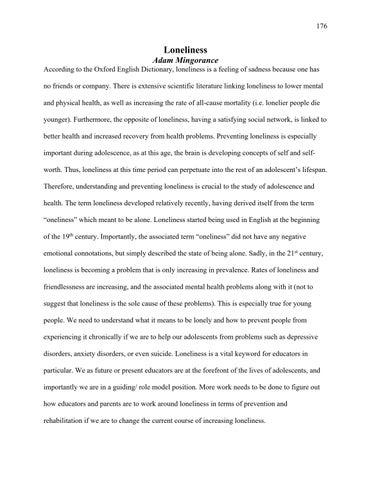176
Loneliness Adam Mingorance According to the Oxford English Dictionary, loneliness is a feeling of sadness because one has no friends or company. There is extensive scientific literature linking loneliness to lower mental and physical health, as well as increasing the rate of all-cause mortality (i.e. lonelier people die younger). Furthermore, the opposite of loneliness, having a satisfying social network, is linked to better health and increased recovery from health problems. Preventing loneliness is especially important during adolescence, as at this age, the brain is developing concepts of self and selfworth. Thus, loneliness at this time period can perpetuate into the rest of an adolescent’s lifespan. Therefore, understanding and preventing loneliness is crucial to the study of adolescence and health. The term loneliness developed relatively recently, having derived itself from the term “oneliness” which meant to be alone. Loneliness started being used in English at the beginning of the 19th century. Importantly, the associated term “oneliness” did not have any negative emotional connotations, but simply described the state of being alone. Sadly, in the 21st century, loneliness is becoming a problem that is only increasing in prevalence. Rates of loneliness and friendlessness are increasing, and the associated mental health problems along with it (not to suggest that loneliness is the sole cause of these problems). This is especially true for young people. We need to understand what it means to be lonely and how to prevent people from experiencing it chronically if we are to help our adolescents from problems such as depressive disorders, anxiety disorders, or even suicide. Loneliness is a vital keyword for educators in particular. We as future or present educators are at the forefront of the lives of adolescents, and importantly we are in a guiding/ role model position. More work needs to be done to figure out how educators and parents are to work around loneliness in terms of prevention and rehabilitation if we are to change the current course of increasing loneliness.
